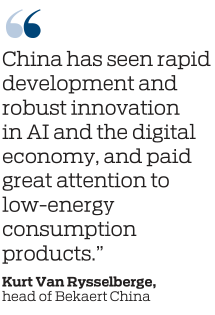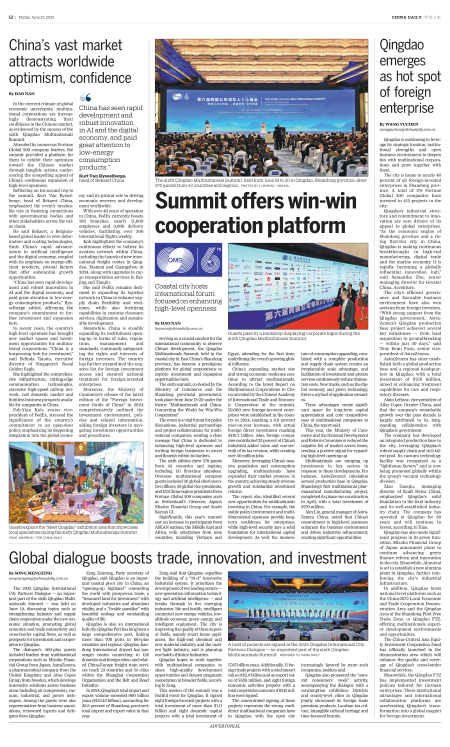

Guests explore the "Meet Qingdao" exhibition area that showcases local specialties during the sixth Qingdao Multinationals Summit.
In the current climate of global economic uncertainty, multinational corporations are increasingly demonstrating their confidence in the Chinese market, as evidenced by the success of the sixth Qingdao Multinationals Summit.
Attended by numerous Fortune Global 500 company leaders, the summit provided a platform for them to exhibit their optimism toward the Chinese market through tangible actions, underscoring the compelling appeal of China's continuous expansion of high-level openness.
Reflecting on his second trip to the summit, Kurt Van Rysselberge, head of Bekaert China, emphasized the event's invaluable role in fostering connections with governmental bodies and other stakeholders across the value chain.
He said Bekaert, a Belgium-based global leader in wire deformation and coating technologies, finds China's rapid advancements in artificial intelligence and the digital economy, coupled with its emphasis on energy-efficient products, pivotal factors that offer substantial growth opportunities.
"China has seen rapid development and robust innovation in AI and the digital economy, and paid great attention to low-energy consumption products," Rysselberge added, affirming the company's commitment to further investment and expansion here.
In recent years, the country's high-level openness has brought new market spaces and investment opportunities for multinational corporations. "China is a burgeoning hub for investment," said Belinda Tanoto, executive director of Singapore's Royal Golden Eagle.
She highlighted the comprehensive infrastructure, cutting-edge communication technologies, extensive high-speed railway network, vast domestic market and limitless business prospects available for companies in China.
Poh-Yian Koh, senior vice-president of FedEx, stressed the significance of the country's commitment to an open-door policy, emphasizing its deepening integration into the global economy and its pivotal role in driving economic recovery and development worldwide.
With over 40 years of operation in China, FedEx currently boasts 103 branches, nearly 11,000 employees and 3,000 delivery vehicles, facilitating over 300 international flights weekly.
Koh highlighted the company's continuous efforts to bolster its aviation network within China, including the launch of new international freight routes in Qingdao, Xiamen and Guangzhou in 2024, along with upgrades to cargo transportation services in Beijing and Tianjin.
She said FedEx remains dedicated to expanding its logistics network in China to enhance supply chain flexibility and resilience, while also fortifying capabilities in customs clearance services, digitization and sustainable development.
Meanwhile, China is steadily expanding its institutional opening-up in terms of rules, regulations, management and standards, continually safeguarding the rights and interests of foreign investors. The country has further streamlined the negative list for foreign investment access and ensured national treatment for foreign-invested enterprises.
Moreover, the Ministry of Commerce's release of the latest edition of the "Foreign Investment Guide of China" in 2024 comprehensively outlined the investment environment, policies and related information, aiding foreign investors in navigating investment opportunities and procedures.

